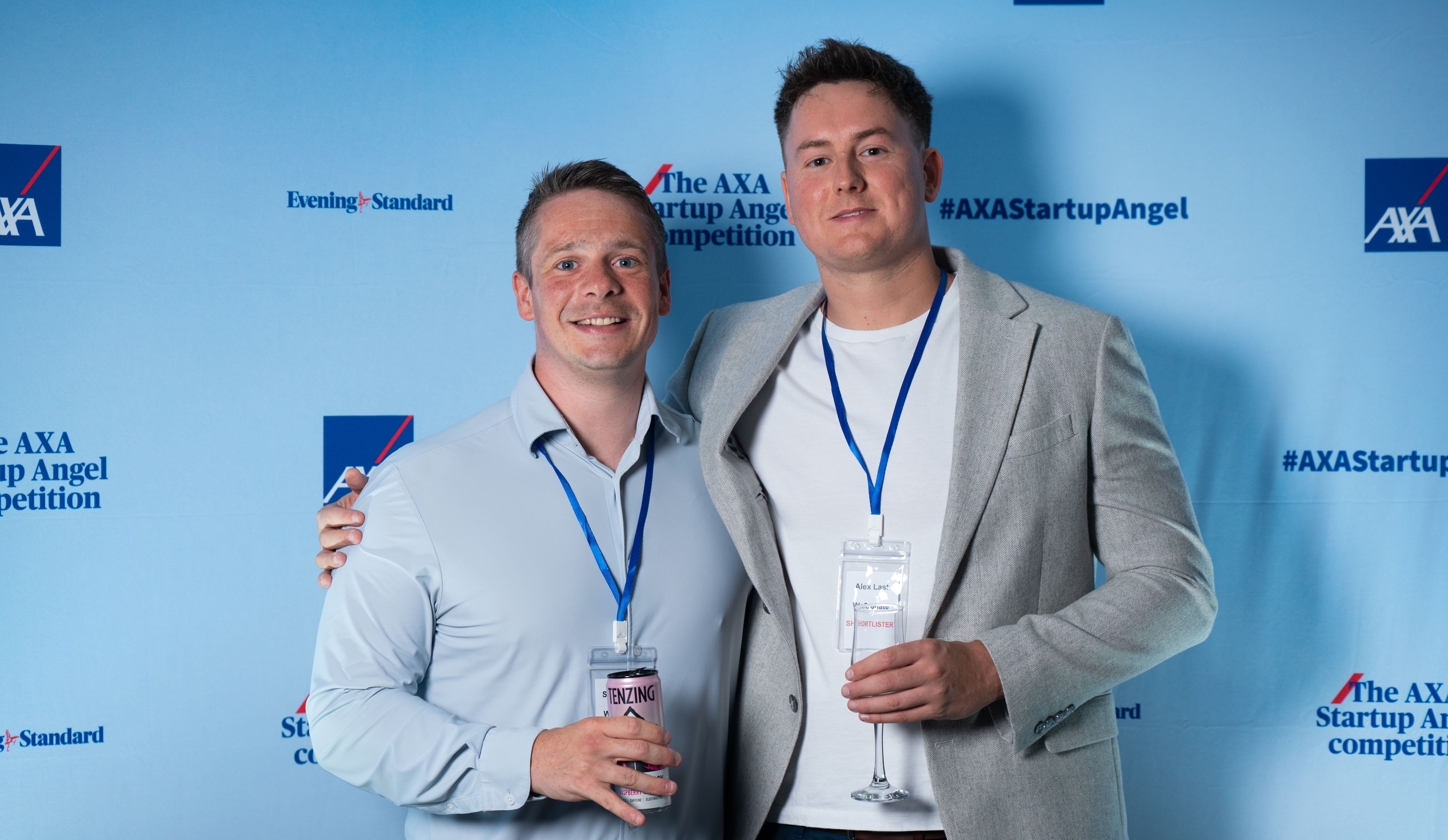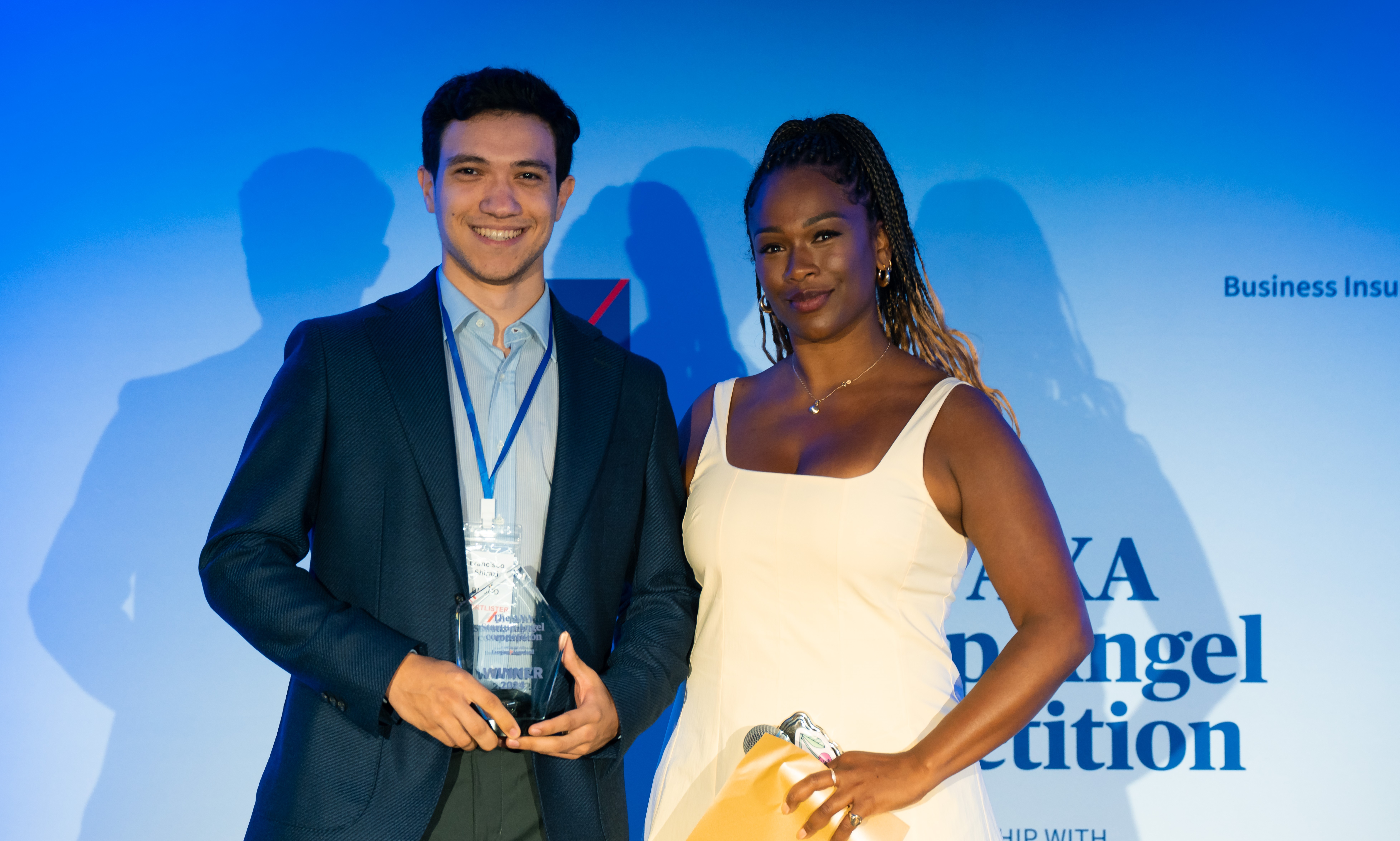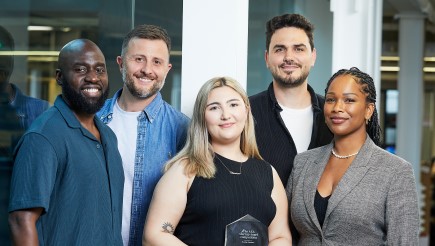For the second year running, AXA has been scouring the UK to find the best new startup business ideas in our AXA Startup Angel competition.
The two best entries would then receive:
- £25,000 of business funding to get their ideas up and running
- Mentoring from AXA’s Startup Angels: Sharmadean Reid of The Stack World; Raphael Sofoluke of The UK Black Business Show and UK Black Business Week; and Ian Theasby & Henry Firth of BOSH!
- Business insurance for their first year
The judging is done, so it’s time to meet the winning startup businesses!
Meet Team Repair
Team Repair started as a university project by a group of students who wanted to get more children interested in science and technology through fixing. Their solution was to source gadgets and technology with carefully planned faults, and through their app teach kids how to repair the faults themselves. Team Repair is now ready to take their university work to the next level and launch as a subscription-based business in 2023. One of their first steps? Applying to AXA Startup Angel.
Hi guys! Can you explain your business idea to us?
[Megan Hale, CEO] Team Repair is a sustainable subscription service where we send out broken electronic gadgets to children to teach them about science and technology and fixing. We want to prove that toys can be and should be sustainable. So we source all our gadgets and electronics from manufacturers and save them from going to landfill, but also our service is circular. We send children these boxes out for fixing and then they send them back to us, meaning there’s zero waste for the product.
What research has gone into the development of this idea?
[Oscar Jones, Product Development] It all started with the goal of combining STEM teaching (science, technology, engineering and mathematics) with repairability. We looked at what got us into STEM originally, how we can get kids interested in STEM, what’s the best age to get kids interested in this sort of stuff as well, so we have this 8-12 year old window for our audience where they’re particularly receptive to these sorts of new ideas.
And we’ve done a lot of user testing. We come up with a lot of ideas thinking ‘it’ll be fun to do this’, but you have to go out and try it. We found volunteer kids to actually hear from real users, then there was a lot of back and forth from that.
What inspired you to apply for AXA Startup Angel?
[Megan] Our biggest challenge is building our 12 month programme of subscription boxes, and to do that we need money to test it, build up stock and develop our app ready for launch next year. That was the main reason for us to apply to AXA Startup Angel. But then also the mentorship seemed like a great opportunity for our business and to help us with our business aims.
And finally the opportunity to get the media coverage from the Evening Standard and to have AXA behind us is great for our business as well.
How did it feel when you found out you won?
[Patrick D. McGuckian, Operations] We were pretty shocked when we found out when we won. It was great but really surprising. The day we found out is a complete blur. It only really sunk in about how amazing it was to have won this in the days later, and now that we’ve started looking again at the business plan with this new funding that’s been unlocked, it’s going to really help us. That’s when we realized how much we can do. We’re delighted.
What do you think you’ll get out of the mentoring sessions?
[Megan] Each of the mentors will be great for our core mission as Team Repair, which is to improve sustainability and inclusivity through our business. So we’re excited for BOSH! to be able to help us with changing consumer opinion about sustainability, which will hopefully allow us to get this circularity with our boxes and making sure the customers are sending the boxes back to us. We also want to ensure that we’re encouraging children of all backgrounds to get into science and technology, so we’re hoping that The UK Black Business Show and Stack World can help us with that mission. It’s a great selection of mentors for our business so we’re excited to get to speak with them.
What kind of questions do you want to ask the mentors?
[Oscar] We want advice on scaling a postal and logistics service like ours. We’ve gone through all the ideas and testing and now we’re looking at scaling, which is new waters for us.
And also, how we can measure our sustainability impact as well. We want to make sure we can validate what we’re doing, so how do we measure our impact is one question for us.
Where do you hope your business will be 10 years from now?
[Anaïs Engelmann, Chief Creative Officer] Currently our product is targeted at 8 to 12 year olds, but we’ve been testing it with children as young as 4 and even adults as well, so long term we’d love to extend it into different age brackets. We’ve spoken about targeting the teenager age and trying to get kids into coding as well and integrating that into our repairs.
What are you most excited about with starting your new business?
[Oliver Colebourne, Tech and App Development] For us it’s a chance to finally see one of our projects actually make an impact. We’ve gone a lot of these at university but now we can finally get a product into people’s hands and actually see the result of that. I’m really excited.
[Anaïs] We’re currently doing a lot of workshops with councils which are free to attend, which is helping us to reach children of all backgrounds and get them interested in fixing. Children who maybe otherwise wouldn’t have been able to get their hands on these types of tools or skills, which is amazing.
What do you think will be your biggest challenges in starting a new business?
[Anaïs] We started this in our final year of university. We were trying to write our final Masters theses while also trying to create this business, and we’ve only just graduated. Up until now it was a time-balancing act. Trying to put as many hours into this as we can but also trying to graduate as well. And now we want to put in as many hours to this as we can but the reality is we have to pay the bills as well. We want to go all in but we’re balancing that with how much we can actually give.
The funding from AXA Startup Angel will allow one member of our team to go full time and for more of us to go part time. And hopefully we can continue on that until we can reach a point where we’re all able to give it our full time and attention.
Some other challenges more specifically with the business will be operations and logistics. It’s an area we’re not as familiar with so I think we’re hoping to get that help from the AXA Angels and mentoring.
It sounds like you did a lot of stakeholder research when developing this idea. How many times did you have to refine the concept based on those interviews with parents and experts?
[Oliver] With a product like this it really has to be built from the ground up, talking to people at each stage. I think that’s how you find a good market for your product. We started by interviewing around interests and hobbies and what parents thought of the subject. We got people’s opinions on repair which led to our first concept. We did this big ideation session to come up with it and then we tried to prototype as soon as possible.
We were lucky that one of our lecturers had a kid, so they were the first person to test our box, which was a really friendly environment to get feedback from. She also had a network of parents of people she knew and we got more boxes out to them and we got really honest feedback. And since then it’s been through workshops of people trying the box, and at each step we’ve learnt something to help improve. We’ve learned that some things can break too easily so we need to reinforce some components, we’ve learned that teaching a certain concept in a certain way helps a child to understand it better than other ways. We’re gradually making little tweaks and it’s exciting to see how it keeps developing.
How do you find getting feedback from kids? Is that different from speaking to parents or experts?
[Megan] You need to learn more about what to listen for when working with kids. One of our key aims is to make our boxes inclusive and part of that is trying to get more girls into STEM. So last week Anais and I went to an all-girls school to give a talk about being a woman in STEM and to let them have a go with our boxes. And now we’ve launched a program in that school where the girls are going to give feedback on how we can make the boxes cater more to girls. We want to receive this harsh feedback now, because we can quickly change the product at the moment. It’s great to get their opinions on the box. Kids won’t hold back.
Tell us more about your marketing efforts. What platforms are working well for you?
[Anaïs] It depends on the audience really. For parents it tends to be Facebook, that seems to be the best way to reach out to them, as well as word of mouth. Whereas for councils and businesses they’re all moving towards Instagram and Twitter, that’s where we’ve had all our B2B partnerships come from. And then things like these repair workshops and cafes have been great for networking and for building contacts, so we’ve met interesting contacts through more in-person and traditional methods.
[Megan] We also used different platforms like Instagram and Nextdoor and we made thousands of leaflets and spent hours handing them out and posting them. We got nothing back from that – we had QR codes on them and got zero scans. You need to find what works for your business and your audience. It’s all learning and now we have a bit more insight about what works.
What’s going into the app that you’re developing? What are some of the challenges you’re facing?
[Oliver] This is the first time we’ve properly tried to launch an app to the App Store. We’ve done a lot of coding projects over the years at university, so it’s exciting to finally get to this stage and be putting something in someone’s hands for them to use. It certainly comes with challenges though. Designing an app for children, from a safety point of view it has to be done in a very specific and safe way. And in terms of the UI it needs to be simple and clear for that type of user, there’s a whole set of guidelines for when it comes to making apps for kids. It’s definitely different from other projects we’ve worked on.
Why is sustainability so important for Team Repair?
[Megan] There’s something like 5% of a product line that gets sent to landfill if there’s something minor wrong with it, like the packaging is damaged or the box is ripped for example. It’s cheaper for them to just send that to landfill rather than to pay for it to be repackaged, but we can offer to take that off their hands and use it in our boxes, rather than create more landfill and save them money too.
You’re looking towards an official launch in summer 2023, what are your next steps?
[Patrick] We need to get the product, technology and operations ready for launch. From a product standpoint we currently have one box which is complete and two still under development, but we need to test them ready for launch. There’s user testing, design, developing tutorials and working with companies to acquire the products in the first place, which is a bit of an undertaking.
And then the technology is all done through our app so we need to get that ready to go so we can function without one of us being present. And for operations, we need to get our returns process working and our logistics sorted so we can keep our margins down. Then there’s things like tax and some admin stuff that we need to figure out. But we’re confident that we’re going to get all that ready for launch in April.
For more about AXA Startup Angel and to follow this year’s winners on their journeys, head over to the AXA Startup Angel hub at www.axa.co.uk/startup-angel
Learn more about our other winner, Muihood, here.






